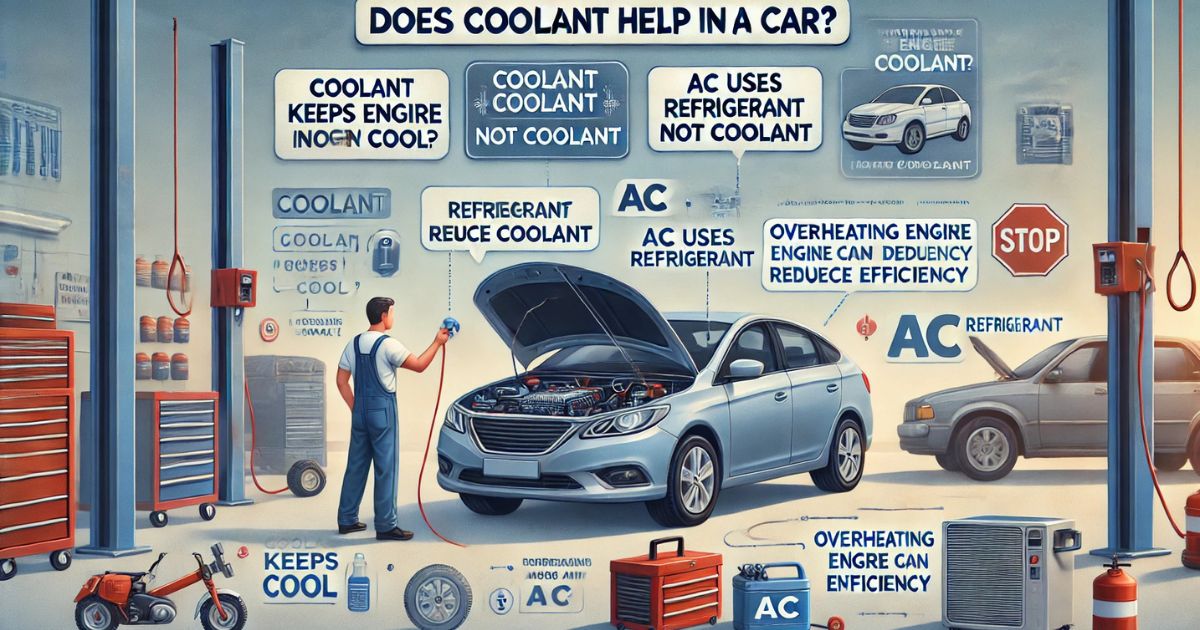
If you’ve ever been in a situation where your car’s AC isn’t working as efficiently, you might be wondering, “Does coolant help the AC in a car?” While it might seem like the air conditioning and coolant are unrelated, they are actually connected through the overall cooling system of your vehicle. In this article, we’ll explain how coolant works, its role in your car’s cooling system, and how it can affect the performance of your AC.
Understanding Coolant and Its Role in Your Vehicle’s Cooling System
Before diving into the relationship between coolant and your car’s AC, it’s important to first understand the role of coolant in your car’s overall cooling system.
What is Coolant?
Coolant, also known as antifreeze, is a special liquid mixture designed to regulate the temperature of your car’s engine. It absorbs heat from the engine and circulates through the radiator, where the heat is dissipated. Coolant helps prevent the engine from overheating by maintaining a balanced temperature range. It also prevents freezing in cold weather and boiling in hot conditions.
The Cooling System in a Car
Your car’s cooling system is designed to maintain the engine temperature at an optimal level, preventing it from overheating. The coolant circulates through the engine, absorbing heat, and then passes through the radiator to release this heat. This system also plays a vital role in preventing the engine from freezing during cold weather conditions.
How Coolant Affects the Air Conditioning System
Now, you might be asking, “How does coolant relate to the air conditioning (AC) system?” The two systems are connected, but indirectly. Here’s how coolant affects the overall performance of your AC:
1. Cooling the AC System’s Compressor
The AC compressor is one of the most important components of the air conditioning system. It helps circulate refrigerant through the AC system, turning it into a cooling agent. While the compressor itself isn’t directly cooled by coolant, the engine’s cooling system helps maintain the optimal operating temperature of the compressor. If the engine overheats due to a lack of coolant, the compressor may not work efficiently, affecting the performance of your AC.
2. Preventing Engine Overheating
When the engine gets too hot, it can cause the AC system to struggle or even fail. Overheating can lead to an increase in internal temperatures, affecting both the engine and the AC unit. Coolant helps prevent engine overheating by absorbing excess heat. When your engine runs at the right temperature, the AC system can perform at its best, providing you with cold air when you need it most.
3. Indirect Impact on Overall Efficiency
An engine that is running too hot due to insufficient coolant may not have the power to operate all systems efficiently, including the air conditioning. In such cases, your AC may blow warm air or fail to cool as effectively. By maintaining proper coolant levels, the engine operates smoothly, and the AC system can work without interruptions.
Does Low Coolant Affect the AC?
Yes, low coolant levels can affect your car’s AC system indirectly. When your car’s engine is not properly cooled due to low coolant, it may cause the engine to overheat. As mentioned earlier, this overheating can lead to reduced AC performance. You might notice the air blowing from the vents is not as cold as it should be, or in extreme cases, the AC may stop working altogether.
What to Do if You Suspect Low Coolant is Affecting the AC
If you suspect that low coolant is causing your car’s AC to perform poorly, here are the steps you should take:
1. Check Coolant Levels
The first thing you should do is check your car’s coolant levels. If the coolant is low, add the correct type of coolant as recommended in your owner’s manual. Make sure the engine is cool before opening the radiator cap to prevent injury from hot coolant under pressure.
2. Inspect the AC System
Once the coolant is at the proper level, turn on the AC and monitor its performance. If the AC still isn’t cooling properly, it might indicate a separate issue with the AC system itself, such as a refrigerant leak or a faulty compressor.
3. Visit a Mechanic
If topping up the coolant doesn’t fix the issue, it’s time to take your car to a mechanic. They can inspect both the engine and the AC system to identify any underlying issues, such as leaks or damaged components, and provide the necessary repairs.
Risks of Driving with Low Coolant and AC Problems
Driving with low coolant can lead to various issues, including:
1. Overheating the Engine
Low coolant levels can cause the engine to overheat, leading to potential engine damage. Overheating can result in costly repairs and may even lead to engine failure if not addressed promptly.
2. Reduced AC Efficiency
As discussed earlier, a hot engine can affect the performance of your AC system. A failing AC compressor or other components due to engine heat can lead to expensive repairs if not addressed early.
3. Increased Wear and Tear
Operating your vehicle with low coolant can cause strain on various systems, not just the engine and AC. This increased stress can lead to quicker wear and tear on other vehicle components, resulting in more frequent breakdowns and maintenance costs.
Conclusion
In conclusion, coolant does play an important role in the overall efficiency of your car’s air conditioning system. While coolant doesn’t directly affect the AC, it helps maintain the engine’s temperature, which indirectly impacts the AC system’s performance. By ensuring your coolant levels are adequate, you can prevent engine overheating, improve AC efficiency, and extend the life of your vehicle.
If you notice any issues with your AC, it’s important to check the coolant levels first. If the problem persists, get your car inspected by a professional mechanic to prevent further damage. Keeping the coolant system in good shape is essential for both engine health and your comfort while driving.
Also Check:
• Can You Pour Coolant Directly Into the Radiator
• How Can We Change Molality Value into Molarity Value




1 thought on “Does Coolant Help AC in Car?”